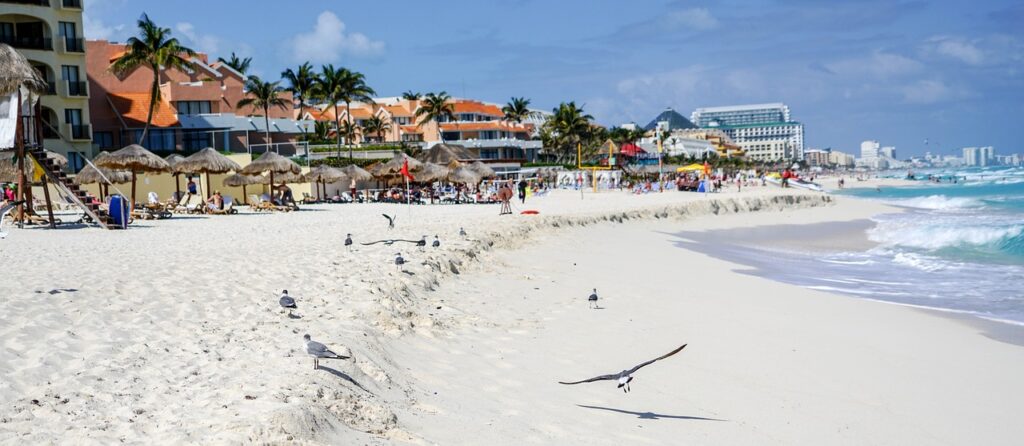Many tourists visit Mexico expecting to experience the white sandy beaches of the Caribbean Sea. They hope to enjoy the rich and colorful culture, and shop the plethora of outlet stores.
What most do not expect is to attend a timeshare presentation. They are either bombarded at the airport by the resort’s marketing reps or approached at their hotel. Their objective is to invite guests to attend a 90-minute sales presentation. They are lured by attractive gifts in exchange for their time.
Most are impressed by the friendly sales staff, the luxurious amenities, and the benefits of becoming a vacation club member. They sign a contract with the down payment, and head back out to the alluring sandy beaches.
Surprisingly, twenty five percent of these vacationers will purchase a timeshare.
Upon returning home and reading the vast amount of negative online reviews, buyer’s remorse sets in. They realize that the friendly salesperson may have lied to them about the program. After some thought, the buyers decide to cancel and expect a refund of their deposit.
If they pursue cancellation during the legal cancellation period, the process is fairly simple, and the buyers walk away without much of a hassle. However, for others who did not cancel within the allotted time, it is too late—and now they feel stuck.
When those who have waited “too long,” contact the resort to cancel the membership, they are harshly reminded that they signed a binding contract and that there is no way to get out.

They surf the Internet for timeshare attorneys and cancellation companies, but soon discover the exorbitant fees. They suspect that they could get scammed again.
There are loopholes that will help members get out of contracts easily without hurting their credit or being sued. The Mexico timeshare industry nor the news media will reveal what I am about to share with you.
So, here are the seven shocking secrets that the Mexico Timeshare industry does not want you to know:
Most Mexico timeshare companies do not own the properties they sell.
That’s right. When you attend a timeshare sales presentation in Mexico, most often, that resort is a separate company. They are owned and operated by a separate hotel management company.
If you purchase a vacation club membership, and you find it difficult to make reservations, chances are, the rooms are reserved for the general public (which is what the hotel was developed for).
Some timeshare companies might only lease one, two, three (or zero) rooms for their members. If you want proof for this, here’s what you can do: try to make a reservation for your resort. If they state that there is no availability during the time you would like to travel, try going online. You will discover that there is availability for the general public—just not for you.
When you purchase a Mexico vacation club, you are purchasing nothing more than an idea. This is why I feel that there should be no maintenance fees as the company has nothing to maintain.
The general public pays less than club members for their vacation package.
Most vacation clubs in Mexico are mandatory all-inclusive resorts that include food, beverages, and some non-motorized sports activities. The benefit for the membership, as explained by the friendly sale staff, is to obtain discount travel over what the general public is paying. However, the members that I have spoken to agree that the prices are much higher than what the general public is paying. That’s right—higher. I have spoken to some clients who were quoted as much as $5,000 for a reservation to learn the same vacation booked online cost $3,000.These exorbitant prices do not include the original purchase price, closing costs, and annual maintenance fees. So, where’s the discount?

Not all vacation clubs are legal.
When you attend a sales presentation in Mexico, you would assume that the vacation club is legal, right? Not so. Many Mexico vacation clubs that actively sell memberships do not have business licenses. They position themselves inside a resort and guests assume that the vacation club is part of the resort. This is not always so.
I worked for a vacation club that was selling memberships under a well-known global resort brand. When I first read through the contract as a sales manager, I realized that not only did the resort not have a business license, but the jurisdiction for any legal matters was not in Mexico, but in Panama. That should stand out, but like most new owners, they never read the paperwork. They simply sign, place their deposit, and return to their vacation clueless.
Many Mexico vacation club sales managers will not only expect their sales staff to lie but will demand it.
The timeshare industry is a very competitive sales environment. In Mexico, the pay for sales and marketing reps is 100% commission. There is no salary. There are also no regulations to protect consumers from unethical practices, and resorts will do almost anything to make a sale.
During my career working in Mexico as a salesperson, the management team expected the sales team to do whatever it takes to make a sale, especially to lie. If the salesperson is not generating the income that management expects, they get fired. Although very successful, I got fired twice and finally resigned because I was not, what they call, “a team player.” In reality, I was staying true to my integrity—refusing to lie to my customers.

The jurisdiction for most vacation club contracts is Mexico—only Mexico.
If you sign a contract in Mexico, and there are legal concerns, according to the contracts, the jurisdiction is Mexico. There are some Mexico vacation club contracts that will establish the jurisdiction in Panama and that should be a red flag.
I have read comments from timeshare attorneys and timeshare cancellation companies that scare potential clients who want to get out of a Mexico timeshare. They tell them that the Mexico vacation club company can take them to court in the U.S. and they could end up in jail and/or lose their house. This could not be further from the truth.
If you are a member of a Mexico vacation club and want to get out, look at your contract. All legal issues are in Mexico, and they will remain in Mexico. A U.S. or Canadian (or any other foreign court) will not recognize and cannot recognize a contract that states Mexico as its jurisdiction.
So, if you decide to walk away from your Mexico contract, they cannot do anything in your own country. The most they will do is send collection letters or make phone calls through a U.S. or Mexico collection agency. Other than that, there is nothing they can or will do legally.
A Mexico vacation club cannot ruin your credit.
This is another absurd claim that I have heard from timeshare attorneys, timeshare cancellation companies, and the news media.
Cancelling a Mexico vacation club contract cannot ruin your credit back home because they do not and cannot have business relationships with American credit reporting agencies. If you purchased a timeshare in Mexico and you want out for any reason, so you stop paying, this action will not affect your credit rating back in your home country.
Here’s the proof: If you took out a loan in Mexico, shouldn’t it show up on your credit report as an inquiry or as a loan? Your monthly payments should also show up. They do not. These activities help develop your credit rating.
To issue a loan and charge interest, whether in the U.S. or not, the loaning institution must have a membership with the credit reporting agencies to report the loan.
Additionally, they must adhere to federal financial regulations such as the truth and lending act, the fair credit reporting act, and others.
This is not the case with Mexico loans. Therefore, walking away from a Mexico vacation club membership will have no impact on your credit rating back home. All they can do is send you threatening letters from collection agencies and hope that one day you will send the balance.
Finally, a high-priced lawyer of a timeshare exit company is not required to cancel a contract.

Some may tell you, you can never get out of a Mexico vacation club contract unless you pay a high priced lawyer of timeshare exit company. This is simply not true.
I have helped countless clients get out of their Mexico contracts even when there was a balance due. The process is written in my book, Everything About Timeshares, which sells on Amazon and Barnes and Nobles.
You can simply walk away and there is nothing they can do. Even if you want to visit Mexico again, you can go and come as much as you like, and nothing will happen to you when going through immigrations.
Regardless of the reasons why you want to get out of your Mexico timeshare contract, you should at least send them some type of communication that you are cancelling the membership and the reasons why.
This is where I can help you. If you would like for me to take care of this for you, please reach out. I will prepare the documents to cancel the membership and prevent collection agencies from calling you.
I can get you out of that unwanted Mexico vacation club contract for a nominal amount within 30 days, and I don’t get paid until the job is done.
If you would like to learn more about what I do, visit this site www.timesharecancellationmastery.com.

